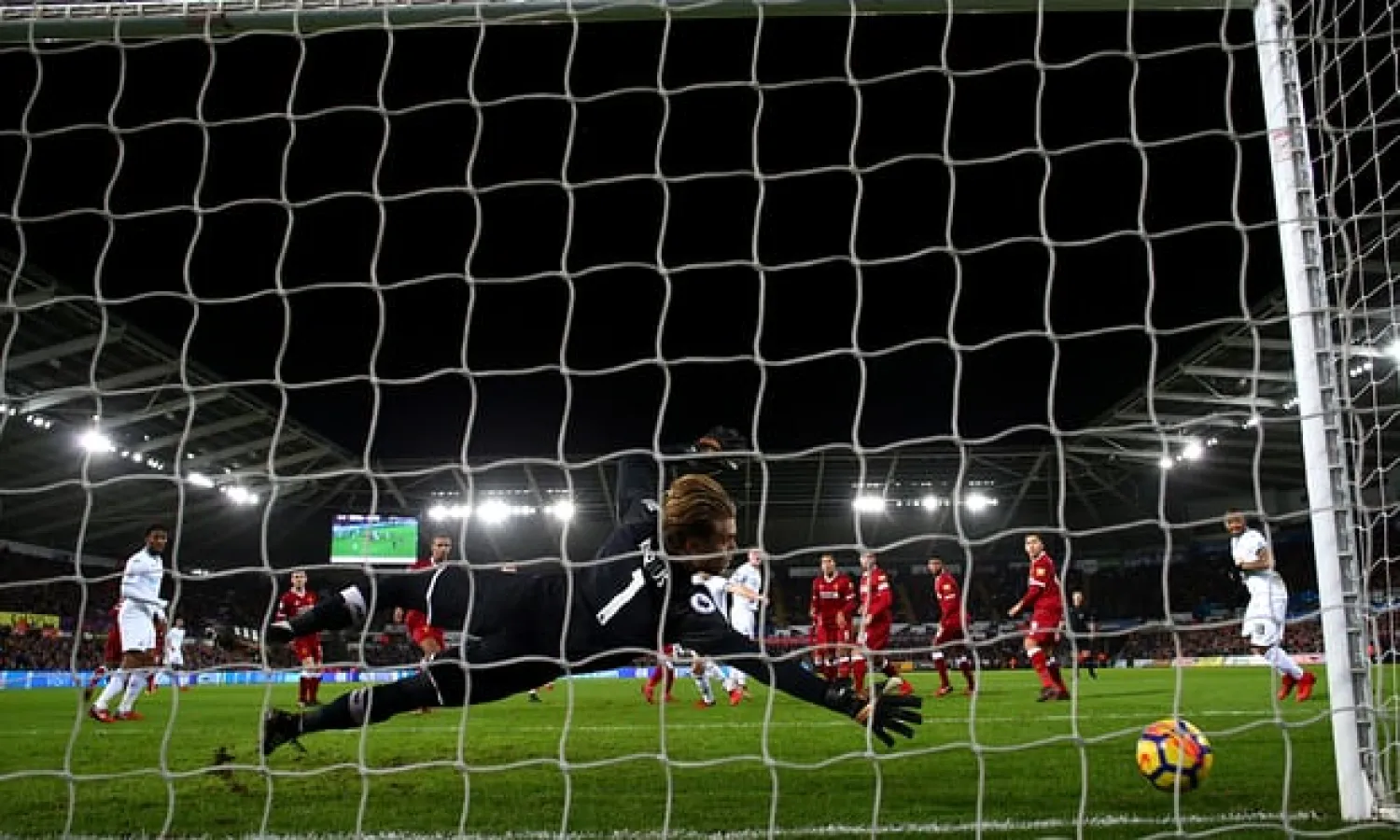Swansea City may be out of intensive care and receiving visitors – Carlos Carvalhal’s propensity for entertaining metaphor could be among the highlights of the second half of the season – though unfortunately, and to keep the medical theme going, a cutting edge is normally required for surgery to be successful.
Valuable as the three points against Liverpool were, they were secured by a goal from a Swansea defender. It was Alfie Mawson’s second of the season, which puts him within reach of Jordan Ayew and Tammy Abraham as the club’s leading scorer. Which is another way of saying Swansea are not scoring enough goals. Ayew and Abraham are both on four in the Premier League and Swansea’s feeble total of 15 goals scored from 24 games is perhaps the main reason why they are propping up the table.
Yet Carvalho is right to be optimistic. Another win could take Swansea out of the bottom three, a couple of wins would see them in mid-table. Very few points separate the teams in the bottom half of the table, mainly because no one else is scoring many goals either.
As a rule of thumb teams looking to avoid relegation need to average a point a game to survive, or at least to arrive in a position where safety can be secured with a late rally. That bare minimum is unlikely to be achieved by teams averaging less than a goal a game – it is a long time since anyone plotted a route to safety through a succession of goalless draws – yet the Premier League table shows no fewer than seven sides have not scored as many goals as they have played games. That is more than a third of the league, and as Southampton have 24 goals from 24 games it means only a dozen Premier League sides are averaging more than a goal a game.
To put those stats into perspective, at the same point last season only Hull and Middlesbrough had fewer goals than games played and both ended up relegated. In the Championship there are three teams bumping along at under a goal a game and in the Bundesliga there are four. The general perception of the Premier League as all-action entertainment seems to be something of a distortion of the truth. Yes, it was notable that after Liverpool became the first team this season to beat Manchester City they were undone by the team at the bottom, but it has become harder to ignore the fact the sides in the bottom half are playing a containing, even dour brand of football that is far from the Premier League hype.
Perhaps Carvalhal put it best when he spoke of needing to create a traffic jam to neutralise Liverpool’s Formula One machine. If you do not allow opponents space to break into, even the best of them can be suffocated, though such a policy is not only risky – you might score from a set piece but equally you might concede – but tough to watch. You have to sacrifice most of your attacking ambitions to stay deep and disciplined in defence – think of Newcastle’s two games against Manchester City. In the first, on Tyneside, they lost 1-0, which Rafael Benítez clearly regarded as a decent result, for upon going a goal behind there was no attempt to send a few more men forward. Benítez had probably worked out that a 1-0 defeat by Manchester City was a less harmful scoreline than some of the teams around him would achieve, and that goal difference could be worth a position or two at the end of the season.
Newcastle might be an extreme example but conservative attitudes among sides outside the free-scoring top five this season must be one reason why goals have been at a premium. Of the top 20 league goalscorers so far, 16 belong to clubs in the top six. The exceptions are Jamie Vardy and Riyad Mahrez at Leicester (equal sixth), Wayne Rooney at Everton (equal sixth) and Abdoulaye Doucouré at Watford (equal 16th). Vardy and Rooney have 10 goals each but below them the struggling starts. None of the clubs in the bottom half of the table have a goalscorer remotely close to double figures.
Marko Arnautovic, Charlie Austin, Glenn Murray and Callum Wilson lead the way with six apiece and, while that may not be the greatest return almost two-thirds of the way through the season, it is better than some rivals are doing. No one at Newcastle, Swansea or West Bromwich has yet hit the five-goal mark, and that includes strikers such as Salomón Rondón, Joselu, Dwight Gayle, Ayew and Abraham. That is why those clubs are either in trouble or close to it, yet no one at Burnley has chipped in with five goals either and Sean Dyche’s side sit eighth in the table. It might be assumed Burnley are sharing the goals around but no, their goals scored total of 19 is identical to West Brom’s; that is to say joint third-worst in the table after Swansea and Brighton.
Dyche has not just been handed a new contract for nothing, though. Burnley have also conceded fewer goals than games played; only the top three clubs can boast tighter defences. That not only appears a recipe for relative success but it means most Burnley games are entertainingly close and worth watching. If only a few more teams below them could say the same.
The Guardian Sport









